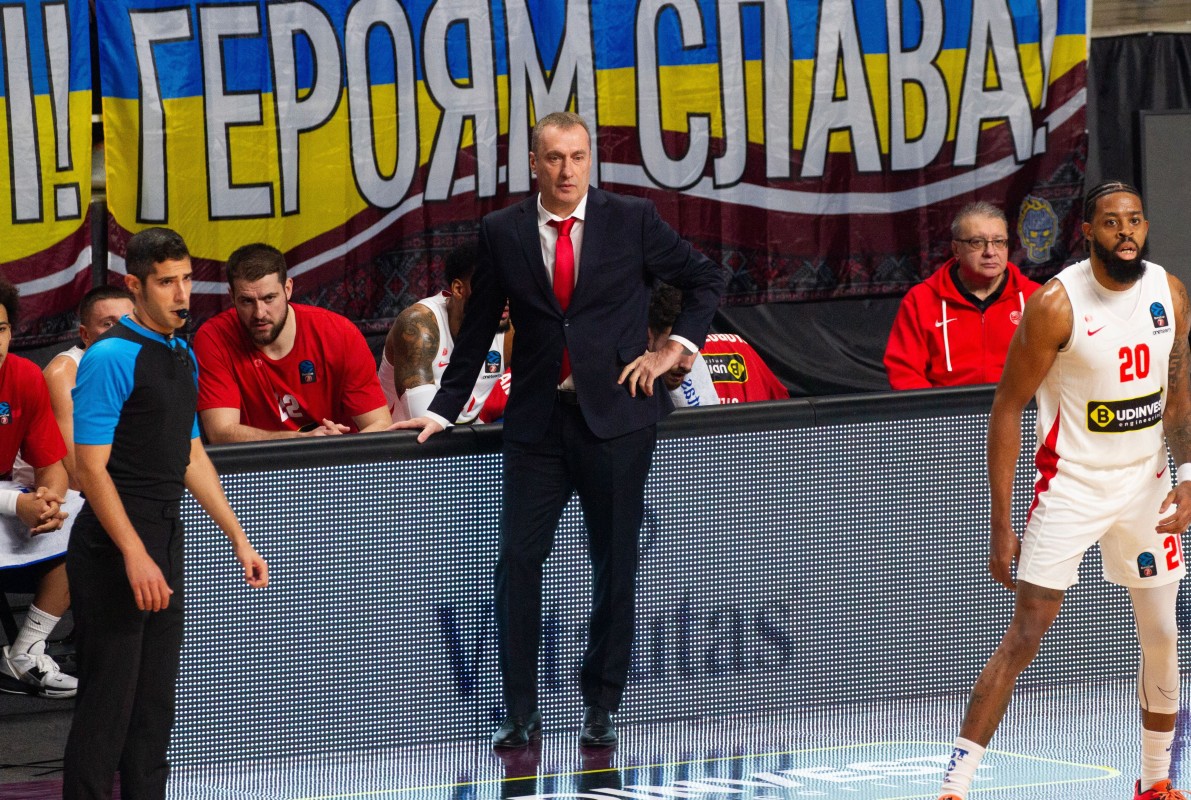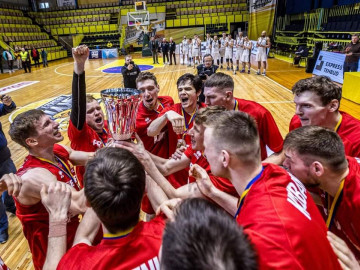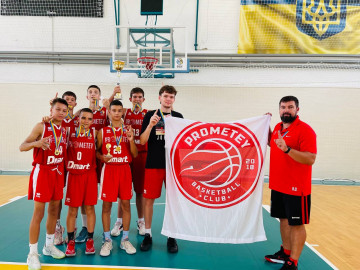
In their incredibly short 5-year history, “Prometey Slobozhanske” has managed to become a symbol of the fighting spirit of Ukraine. The war has forced them to move to Latvia but has not prevented them from winning Group A in EuroCup. Coach Ronen Ginzburg told Future Stars about the incredible jorney with a team, which has not only successfully competed in Europe but also demonstrates the incredible vitality and survival spirit of Ukrainian nation.
-Ronen, you are in “Prometey” in a very turbulent time, yet against all odds you have won Group A in EuroCup. What are your thoughts about the season so far, especially your achievements in EuroCup?
-I came to “Prometey” 2 years ago in the middle of the season. Then, last year tha war stopped us. Everyone thought that this club is finished, but our president Volodymyr Dubynskyi surprised everyone, and he decided to show everyone that Ukraine continues functioning. Initially, Dubynskyi decided that all money should go to the army, but then he has changed his mind and decided to support both sport and military sending money to the army and the hospitals. It was important for our club, including our volleyball section, to show that life goes on even in the most difficult times. Of course, we had to move the team to Latvia, which was not easy for administrative reasons. It was not easy to bring all players here because of the Latvian rules. Our goal was to play well and succeed and at this moment, we believe in it and are very satisfied.
-How difficult is it to run a team, which is removed from their original country and play far away from their home and fans?
-From a technical point of view, it’s not difficult. It’s a nice arena and nice sporting complex to practice. The problem is that you don’t have fans for most of the time. Sometimes, our president brings our fans from Ukraine. One time he helped them to come to Venice, their trips to Riga took them 48 hours by bus. But now, when we are more successful, we are getting more Latvian people and, of course, Ukrainian refugees, who live in Latvia, started coming to our games. However, we still have situations, when we play great games in front of 1000 spectators. Of course, I understand how the situation affects our Ukrainian players. I made it very clear and always tell them that if the situation at home stresses then too much they should take time off. If they cannot focus on practice, then they shoul not practice. However, when they are on the court they must act professionally, work hard and give 100%. The situation is very difficult, their wives and children are with them, but the rest of the family stays in Ukraine. It’s not easy for them.
-There is similar precedent for a situation where a team played their home games abroad. “Jugoplastica Split” played their home games in Spain at the beginning of Yugoslavian war and won European Cup that year. So maybe you can write a similar story?
-I wish that could happen. We are still underdogs; we know our strengths, but we are aware of our weaknesses.
-Do you think that for your Ukrainian players, playing for “Prometey” brings a sense of being ambassadors for their own country and shows that despite of the war they can bring joy and pride for their own people?
-For sure. They bring their flag on their shoulders during the presentations. They feel very patriotic when they play both for “Prometey” and for the National Team. We are very proud and supportive of them. I tell them that if you come from Ukraine, you must be a fighter. In difficult times, the fight is the only thing that you have.
-How difficult was to build such a successful team in such a short period of time?
-For sure, it was not easy at the beginning, but we had a clear plan how the team should look. Sometimes you think that you have right people but then you find out that it’s not exactly like that. Then you have to analyse your strengths and weaknesses again and try to find new players to make sure that your rotation is 10 players, not 7. We make constant adjustments; it’s a process that never ends.
-At the moment, you have exceeded the expectations, so what are the goals for the rest of the season?
-We are also pretty good in the Latvian-Estonian league. In the EuroCup, there is such a system that one single game can eliminate us from further competition. Playoffs can be very cruel, look what has happened last year. “Partizanm” and “Joventut” led their groups and lost in the first round of the playoffs. Now we know where we are in the playoffs and we want to go as far as we can, but as I said, one game can change everything. I like this system from the beginning. You can surprise everyone, in one game you can change everything.
-Building very resilient teams from players who are not perceived as superstars seems to be your forte. You have done the same with Czech Republic National team, which sat in 6th place in the World Cup and 9th place at the Olympic Games in Tokyo. What is your recipe for building very coherent teams where all players are ready to support each other?
-When I was a young coach, I paid too much attention to purely basketball abilities and talent while not paying enough attention to the character of players. When I became older, I learnt that sometimes I have to give up on more talented player and bring the one with slightly less quality but much more character. Of course, you can’t take all players with great character but no basketball quality. The key is to find a right mixture between both. I think, we achieved it at Nimburk, where on a relatively small budget we built a very successful team. On the technical side, you need to find players who like your system and style of basketball. I like playing fast high tempo game when player must think fast. I want aggressive defence and offensive rebounds to give us possession. Not every player can play like that. There are a lot of great players who prefer to play slower and have ball in their hands longer. It was easier for me with the National team because I had quite a few players from “Nimburk”, who obviously knew the system such as Tomas Satoransky and Jan Vesely. When they joined, they straight away both fit into this system very well. This is what gave that success. Another important factor was the fact that both Storansky and Vesely and, before them, Lubos Barton are such humble people with the great character. Sometimes, I see other National teams, where players come from the NBA and are so aloof and not together. They always criticise something or complaining. We had a completely different mentality in the Czech National team, it was completely different.
-Do you think you are close to building a similar chemistry at “Prometey”?
-I hope so. We are not there yet, but there is a lot of similarities. We brought here not the biggest names, but we managed to build very dangerous team. Look, how we dealt with injuries. We lost Caleb Agada for a long time and we cover it with chemistry, productivity and fight if the other players.
-On top of that, in the last game you have lost DJ Kennedy, apparently till the end of the season. How are you going to deal with it?
It is very difficult. DJ was very important to us. We can’t bring another player. I will speak to the players and we will try to solve this problem. They must get together and produce what Kennedy was giving us. We must digest the situation and react quickly.
-Many thanks and all the best with the rest of the season.



